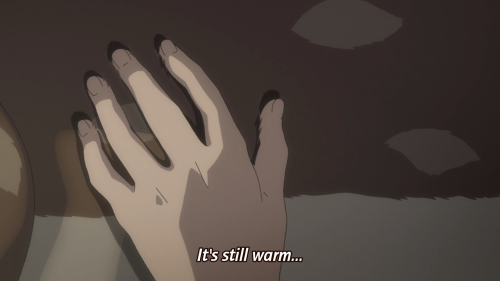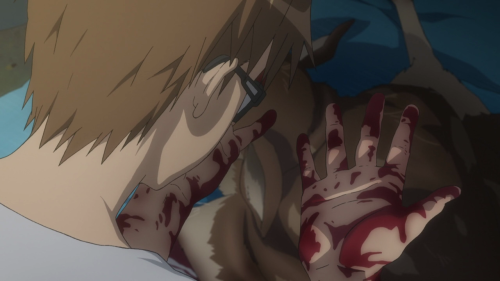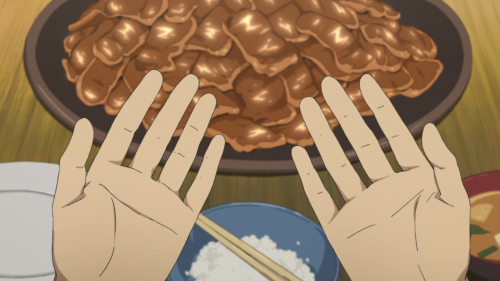In another life, I may have been a vegetarian, but in this day and age of supermarkets and their aisles of prepared meat, it’s hard to imagine something as generic as a chicken breast once belonging to a living animal. Don’t get me wrong, I’m well aware that it does, but having been divorced from the source of my food for the whole of my lifetime, eating meat is something that I do because I’m hungry and it’s food. There’s no moral quandary for me because, for the most part, I never think to question where any of it came from. If it tastes alright, I’m fine with it.
At the same time, I’m an animal lover. I have a cat (bad-boy Boris) and a dog (wimpy Splash) and to see them in pain is akin to injuring myself. It’s not just pets either, because if I can avoid stepping on something as tiny as an ant, I will.
As the summer season waxes and wanes, Silver Spoon (Gin no Saji) is one of the two new anime (the other being Sunday without God,) that I’ve managed to keep up with. Created by Hiromu Arakawa (Fullmetal Alchemist,) it’s the story of Hachiken’s tentative entry into the world of Japanese agriculture. Fresh from his suburban school life but desperate to escape the claustrophobia of conventional academia, he enrols at a farming college far and away from his old school and like me, has something of a sheltered exposure to food production in-tow.
It’s one thing knowing where your food came from, but another thing entirely to see it happening. Early in the series, there’s a particularly memorable scene of a chicken being beheaded, to my mind an image less notable for the blood, but for rather the matter of fact way in which it was executed. Later on, Hachiken eats some of that same chicken. Real or not, I can’t deny, it looked delicious.

In episode six, Hachiken is asked to butcher an already-dead dear. He hesitates. It’s carcass is still warm, a sign that, until very recently, it was still alive. A wild, beautiful animal. Faced with that, I’m not sure I could do it, but Hachiken does. Coming to terms with our place in the animal kingdom, having respect for an animal’s life at the same time as taking it away, butchering it and then eating it, these are the very real, difficult decisions that may define a person’s will to live. Hachiken has already run away from his old life, is he going to run away from this new one, too? “What’d I do all day?” “Why am I here?” After a quick prayer, the knife goes in and the skin comes away. They eat it later that night over a barbecue, but Hachiken can’t seem to shake the smell of blood from his hands. It’s a delicious feast, but it’s hard to forget where it came from. You shouldn’t forget.


Silver Spoon is headed towards a difficult finale. At the school, they raise pigs for slaughter and butcher the meat, but Hachiken has taken one particular little piglet into his heart. The runt of the litter, he’s named it “Pork Bowl,” so he fully intends to eat it, but having spent so much time raising it, can he do it? Again, I don’t know if I could, I don’t think he knows either, but with the way that Silver Spoon has gone so far, I think he will. In a story that’s clearly about the reality of animal produce, it makes sense for him to make the hardest of choices, but more than just a conceit to Arakawa’s agenda of demystifying agriculture, it promises to be an emotional moment. To take an animal’s life, at least to me, means carrying a heavy weight of responsibility, and to Silver Spoon’s credit, it understands that. It might be difficult to watch, but for me to look away at this point would be even worse.
Still warm
6 responses to “Still warm”
-
I think one of the big deal that needs to be looked at equally in the way you’re approaching the meat-and-animal issue is that your appreciation for animals changes drastically, too, if you grew up on a farm.
It’s only a sheltered city boy that will probably get too attached to butadon and get hit the hardest when he becomes BBQ butadon. It’s somehow not as traumatic when you had to go through that when you’re like 6yo, before you were old enough to learn all there is about the animal kingdom from “scrubbed cleaned” means such as pet shops, text books, and television. -
I’ve already resigned to the fact that I simply don’t belong to the target demographics of this series, but the more I read about it the more I feel like a horrible, heartless person. ^^;; Maybe my childhood was less sheltered than I thought in this respect, maybe it’s my general interests skewing my view (I’ve been a big fan of animals and nature all my life), or maybe it’s a cultural thing, but…
I know the show is about Hachiken, a sheltered city kid, learning the cold hard truths of life and all, but it’s a dead deer. Yes, one feels sorry for the poor animal, and in any case butchering it is not a pleasant experience, but… it’s already dead. (I would’ve understood the angst if he’d had to mercy kill it, or if it was a dog or a cat or something.) More than anything, I wondered about him being so completely OK about them hitting that bear. (Especially because I don’t think that car of that size could hit a bear of that size and kill it instantly.)
I mean, I don’t know – this show makes a big deal of “animals die so we can eat meat,” but to be honest, as far as soul-searching goes I had to fight a lot more with myself to accept my love for Tsuritama, a show which is centered around a sport that involves hurting and killing animals. -
In many ways Silver Spoon is a more remarkable work than Fullmetal Alchemist. However, it’s many shades more subtle which means a huge amount of people have already written it off. I’m often reminded of the scene of Ed and Al, as children, during their initial “training” period with their sensei – coming to the conclusion of what “All is one, one is all” means is a central tenet of Silver Spoon, as it was for FMA. The execution of that idea in FMA was much more grandiose and fantastical, but ultimately they’re both getting at the same theme.
I remember my mom used to tell us stories about slaughtering chickens on the farm she grew up on in the Philippines. She used to laugh about how, “for fun”, they’d cut off the chicken’s head and then let it run around. Apparently the moment of death, combined with the fact that the heart is still pumping allows the chicken to run around without its head (giving rise to the phrase “running around like a chicken without a head” I suppose). Me and my sister would look on horrified as she explained that, to avoid having the blood spurt from its neck all over the damn place, the best way to kill a chicken was to catch it and pin its wings with your feet, so that when it started convulsing and trying to run after you’d killed it, it couldn’t get away.
Both Silver Spoon and FMA question the morality of human life, in some ways: that we kill and dominate other creatures, and other people, for our own gain. -
It’s authenticity concerning the agricultural lifestyle is the initial hook and certainly a boon of Silver Spoon, and the author’s firsthand experience comes through here, but its relatable humanity is what makes the story compelling. These character have dreams, aspirations, and egos, and come from very grounded places of home and family.
I often forget they’re only in high school level education, because I tend to attribute this kind of matured sensibility to stories set on college or beyond. -
I was a sheltered city boy too and man, field-butchering is nasty (fur getting everywhere for one), but I don’t understand where the angst is coming from. Not viscerally, anyway. I remember once we caught a mouse in our appartment. We lived in one of those awful concrete high-rises that Japanese call “mansion” — what a joke — but mice can get anywhere. My mother didn’t want to stomp it or let me do it, so she put it into a plastic bag and threw it out into frozen garbage heap. Oh yeaaaah, that’s way more humane OR IS IT? What bullshit.
You sitll want to isolate yourself from animal blood when butchering, however. Deer carry all sort of nasty diseases and parasites, so untill it’s well cooked — no contact! Heck it’s still unknown if its prions can jump species and turn your brain into jelly, AFAIK.
Japanese may have a different view on it, which is not necessarily better informed. For example, many old people in Hokkaido think nothing of drinking from wild streams, although it’s well known that Ecchinococus is in there. When asked, they say that the parasite takes 20 years to kill a human, and they aren’t going to live that long. Yeah. -
Yes, animal, food and human relationship is interconnected. I think a comment i heard which was directed at vegetarian was loud.
It was about through the type of food we eat where it came from an animal, we are preventing the animal getting extinct. So eating meat is normal.
We are what we eat. I do hope people do appreciate how farmer grow food (animal and plants) is hard and tough.
Watching anime is always a good way to learn new interesting thing like Silver spoon did to me.
Do remember to say grace (Itadakimasu) everytime, be grareful of what we eat and use the energy of the food we ate to do good for the world.

Leave a Reply